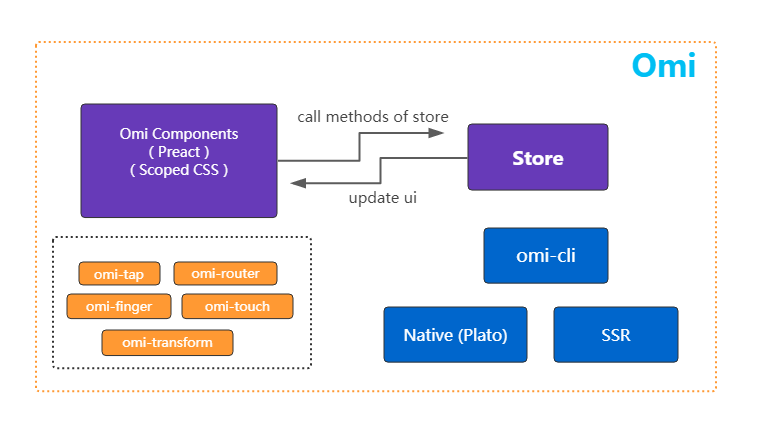|
|
||
|---|---|---|
| assets | ||
| config | ||
| debug | ||
| devtools | ||
| dist | ||
| examples | ||
| plugins | ||
| src | ||
| test | ||
| tutorial | ||
| .babelrc | ||
| .editorconfig | ||
| .eslintignore | ||
| .flowconfig | ||
| .gitignore | ||
| .travis.yml | ||
| LICENSE | ||
| README.CN.md | ||
| README.md | ||
| index.html | ||
| package.json | ||
| typings.json | ||
README.md
English | 简体中文
Omi 
Omi === Preact + Scoped CSS + Store System + Native Support in 3kb javascript.
Omi has prosperous ecology and strong features through the second-hand preact developments:
- Super tiny size and Super fast
- Extensive React/Preact/Omi compatibility
- Scoped CSS, made css selector simple
- Each component has a update method, you can continue to use setState
- Store system, data and logic of components management for omi without other frameworks dependencies
- Server side render, Native Suppport, ES6+, JSX, VDOM, React DevTools, HMR ...
Getting Started
Hello Omi
import { render, Component } from 'omi';
class Hello extends Component {
render() {
return <div> {this.props.name}</div>
}
}
class App extends Component {
install() {
this.name = 'Omi'
this.handleClick = this.handleClick.bind(this)
}
handleClick(e) {
this.name = 'Hello Omi !'
this.update()
}
style() {
return `h3{
cursor:pointer;
color: ${Math.random() > 0.5 ? 'red' :'green'};
}`
}
staticStyle() {
return `div{
font-size:20px;
}`
}
render() {
return (
<div>
<Hello name={this.name}></Hello>
<h3 onclick={this.handleClick}>Scoped css and event test! click me!</h3>
</div>
)
}
}
render(<App />, 'body')
Different to preact, you need not to import { h } from 'omi'.
Tell Babel to transform JSX into Omi.h() calls:
{
"presets": ["env", "omi"]
}
You need install env and omi preset for the config:
"babel-preset-env": "^1.6.0",
"babel-preset-omi": "^0.1.1",
Scoped CSS
What'S the different between style and staticStyle method ? For example:
render() {
return (
<div>
<Hello name={this.name}></Hello>
<Hello name={this.name}></Hello>
<Hello name={this.name}></Hello>
</div>
)
}
The style method will render three times to html head element, the staticStyle will render one times only !
When you update the component style method will rerender, but the staticStyle will not rerender.
if you want to use the scoped css but you did not want write it in your javascript, you may need to-string-loader, see the omi-cli config:
var styleRules = {
'scoped.css':{
test: /[\\|\/]_[\S]*\.css$/,
use: [
'to-string-loader',
'css-loader'
],
include: path.resolve(config.webpack.path.src)
},
'scoped.less':{
test: /[\\|\/]_[\S]*\.less$/,
use: [
'to-string-loader',
'css-loader',
'less-loader'
],
include: path.resolve(config.webpack.path.src)
},
'scoped.stylus':{
...
...
If your css file name is begin with _, the css content will use to-string-loader.
Store
import { render, Component } from 'omi';
class Hello extends Component {
render() {
return <div>{this.props.name}</div>
}
}
class App extends Component {
constructor() {
super()
this.handleClick = this.handleClick.bind(this)
}
handleClick() {
this.$store.rename('Hello Omi !')
}
render() {
return (
<div>
<Hello name={this.$store.name}></Hello>
<button onclick={this.handleClick}>Click me to call this.$store.rename('Hello Omi !') </button>
</div>
)
}
}
class AppStore {
constructor(data, callbacks) {
this.name = data.name || ''
this.onRename = callbacks.onRename || function () { }
}
rename(name) {
this.name = name
this.onRename()
}
}
const app = new App()
const appStore = new AppStore({ name: 'Omi' }, {
onRename: () => {
app.update()
}
})
render(app, document.body, appStore)
You can use this.$store in all components to access the data or the data or data logic.
Lifecycle
| Lifecycle method | When it gets called |
|---|---|
componentWillMount / install |
before the component gets mounted to the DOM |
componentDidMount / installed |
after the component gets mounted to the DOM |
componentWillUnmount /uninstall |
prior to removal from the DOM |
componentWillReceiveProps |
before new props get accepted |
shouldComponentUpdate |
before render(). Return false to skip render |
componentWillUpdate / beforeUpdate |
before render() |
componentDidUpdate / afterUpdate |
after render() |
CLI
$ npm i omi-cli -g # install cli
$ omi init your_project_name # init project, you can also exec 'omi init' in an empty folder
$ cd your_project_name # please ignore this command if you executed 'omi init' in an empty folder
$ npm start # develop
$ npm run dist # release
Install
npm i omi
or get it from CDN:
Official Plugins
- omi-tap: Support tap event in your Omi project.
- omi-router: Router for Omi.
- omi-finger: Omi /AlloyFinger integration.
- omi-transform: Omi /transformjs integration.
- omi-touch: Omi /AlloyTouch integration.
Links
- preact github
- preactjs.com
- omijs.org
- server side render
- differences to react
- native support
License
MIT © dntzhang
